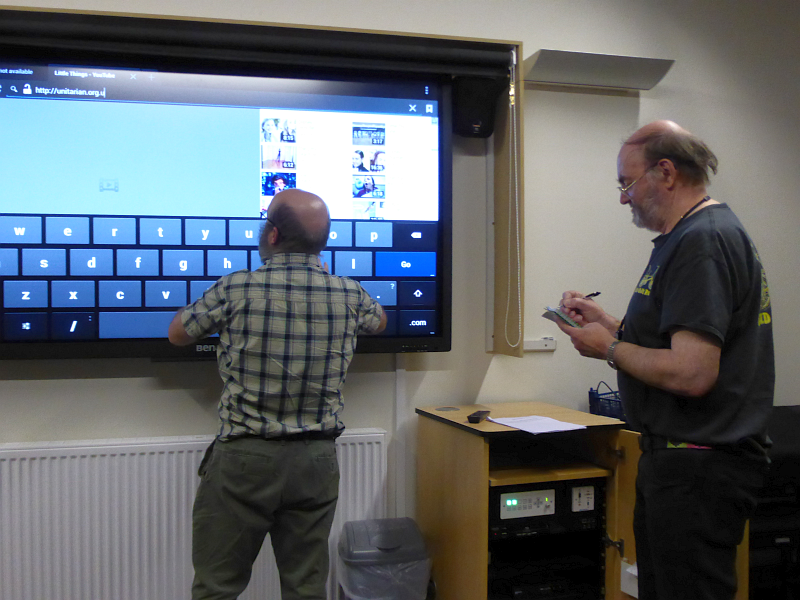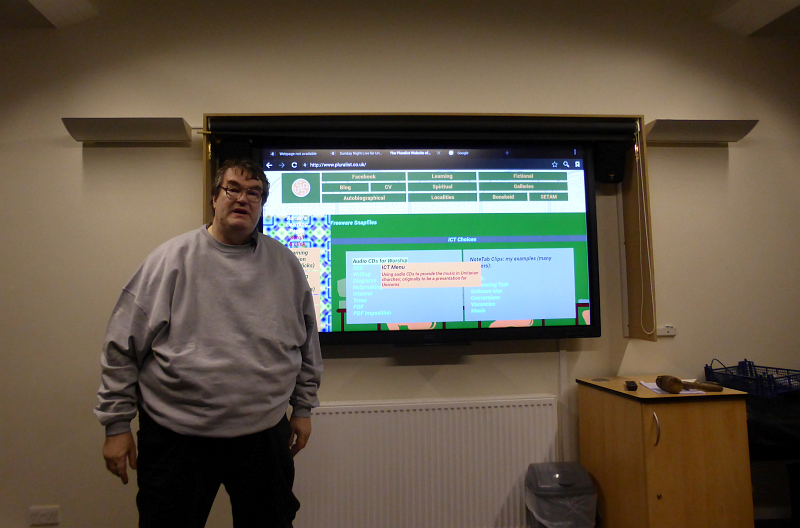
Long ago many congregations needed a web presence and had none. The DUWIT team made a template website for which congregations could fill in the blanks submitting content like pictures and text to the team. 110 congregations have used this method. Two people handled English Unitarian websites and one person Welsh Unitarian websites. People did not like waiting, however, for the team to respond with uploading material.
Now a new demand has arisen: websites must be compatible with mobile phones and a range of devices. There are also varieties of browser.
Wordpress can handle all the varieties. As regards having a specific, different, local website, perhaps completely home made, James Barry told of his own experience. He has long experience of writing sophisticated webpages by hand. He can write in HTML, PHP and Javascript. His PHP can generate .PDF files. But with the variety of devices and browsers, and an expectation of the Wordpress look, he concluded that he can no longer do it. 'Mistakes' appear because the code never meets every requirement, and browsers try to interpret what HTML code etc. should produce. whilst Wordpress has some 30 to 40 style sheets triggered with extensive PHP use to take account of every variation of presentation.
James Barry created UK Unitarian TV himself as a webpage template. It was made to be very technically flexible. And yet, "Look at it in a mobile and it is crap." James Barry demonstrated how some text is out of place; this is also the case for some browsers and screen dimensions with the main UK Unitarian website. Sunday Night Live TV for Unitarians was developed from a mobile template and worked on in Dreamweaver. But it is not guaranteed. Yet use Wordpress and the result is certain.
There is talk about browsers not allowing Javascript or Java [these are different]. This is highly unlikely in practice given the ubiquitous use of especially Javascript thoughout the World Wide Web.

I asked, "What about companies, such as at Hessle near Hull, that is forever advertising for coders, and produces dedicated websites for customers?" James Barry said they mainly deal with 'front end' appearances and leave the back end to existing templates [e.g. "add to cart" workings] but what happens is that they deliver the front end appearing website to the customer and attempt to stress-test it on as many devices and varieties of presentation as they can.
The intention for Unitarian websites is consistency. Some years ago the Visibility Strategy Group produced logos and a colour scheme for publications, and linked funding to their use.
The plan is to move all Unitarian websites to the new Multisite Wordpress system. The domain unitarians.org.uk has now been acquired and there are about half a dozen draft subdomains (4 November 2016).
This consists of a subdomain and a domain. The domain including all subdomains is controlled by designated 'Super Admin User' (from the DUWIT team) and the subdomain controlled by subdomain 'Admin User' as decided.
This approach gives a consistent pattern. For example, http://www.york.unitarians.org.uk has the subdomain 'york' and should have a York-based Admin User. (Notice how at present - November 2016 - when the website is loaded it changes the URL at the top.)
The method will be for a Super User to take an existing congregational website and clone it. This will then be delivered back to the congregation's Subdomain User to manage from then on.
For example, in Hull, the existing Hull Unitarians Wordpress website will be taken, cloned, and replaced by the subdomain of the multisite version of Wordpress. The webmaker of the Hull site will then have subdomain access to the Hull Unitarians Website only. (That it is already Wordpress presumably makes it easier to clone, pages will easily look the same).
There is also the intention for the DUWIT team to provide content to congregations after cloning, such as a presentations of questions and answers that non-Unitarians ask. There will be videos of ministers and book extracts regarding these questions and answers. Congregations via the Subdomain User can then remove the content not wanted. This removing what is not wanted is easier than adding material.
There are a number of problems, however, in going over to the multiuser Wordpress website.
For example, the guideline for material is that people searching to explain 'Unitarian' will give the webpage ten seconds to produce an answer. Again, this requires certainty of presentation but because Wordpress has to examine for compatibility (via all the stylesheets) it is slow to load.
Secondly, the simplicity of the established template system via DUWIT will be replaced by a required knowledge base within the congregation. Some congregations will not have the personnel for Subdomain administration. James Barry is "dreading" what may happen with demands for website changes.
Furthermore, he himself has coded Unitarian websites with the kind of flexible use that Wordpress does not include: for example, PHP code at present makes a newsheet and chucks out the old one automatically. This will not be possible with Wordpress.
It may be that in the future simplicity regarding websites returns, but at present complication has taken over. My own emphasis is simple coding (basic stylesheets etc.).

(That so many users expect Wordpress, it is becoming dominant; even with replacing confident and sophisticated coders, this is part of the trend towards monopolisation within the Internet. A system designed for variety has moved towards a few gateways for content.)
Adrian Worsfold
Pluralist - Liberal and Thoughtful